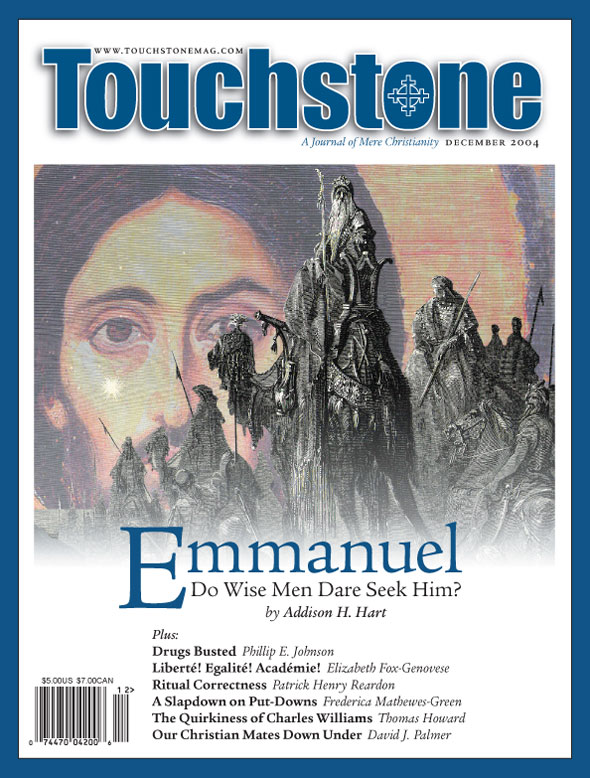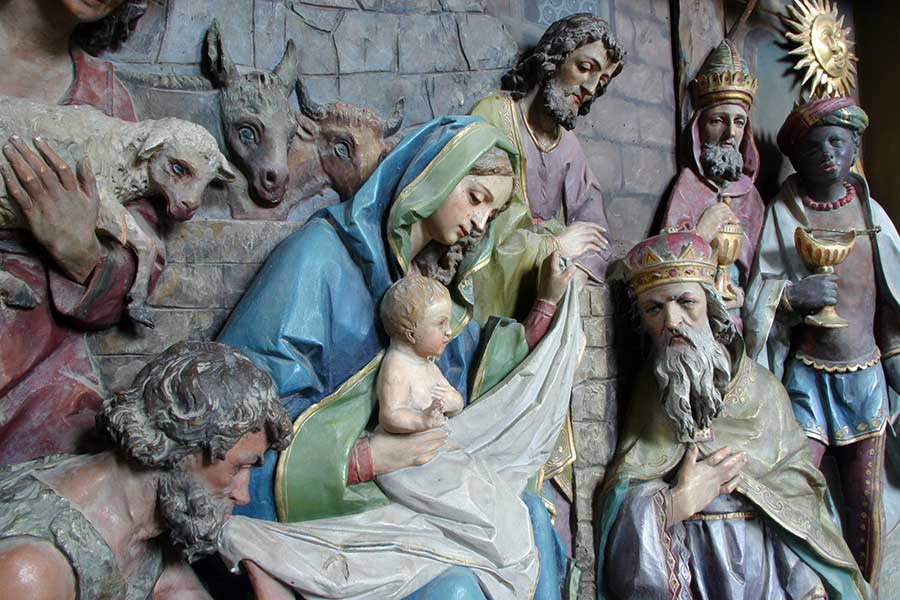Emmanuel Is with Us
A Sidebar in Addison H. Hart’s “The Divine Divider”
The name “Emmanuel,” which in the New Testament is found only in the Gospel of Matthew, introduces an important theme in that Gospel. Its insertion near the beginning of Matthew (1:23), accompanied by the explanation that the name means “God with us” ( meth’ hemon ho Theos), is the first part of a literary inclusio, the second part of which comes in the very last verse of that Gospel: “Behold, I am with you ( Ego meth’ hymon) all days, even to the end of the world” (28:20). These two assertions of God’s presence with us in Christ thus serve to frame Matthew as a whole.
The second assertion, “I am with you,” is clearly ecclesiological and is placed in a context where Matthew roots the extended mission of the Church in a solemn Christological affirmation: “All authority in heaven and on earth has been given to Me. Go, therefore, and make disciples of all nations.” These nations are thus to be gathered into the Church, in which Christ, having all authority in heaven and on earth, abides until the end of the world. At the end of Matthew, we perceive the full meaning of the name Emmanuel, with which he began.
Correctly to understand this, however, we should observe that Matthew’s earlier text also joins Christology and ecclesiology. He cites Isaiah 7:14—“Behold, a virgin will conceive and bear a son, and you shall call his name Emmanuel”—by way of declaring that this prophecy and the meaning of this name are fulfilled in the event foretold to Mary’s betrothed: “Joseph, son of David, do not be afraid to take to you Mary your wife, for that which is conceived in her is of the Holy Spirit. And she will conceive and bear a Son, and you shall call his name Jesus, for he will save his people from their sins” (Matt. 1:20-21).
To whom, if not to the Church, does Matthew refer by the expressions “us” and “his people”? His Gospel, after all, is presented as an introductory compendium of those things in which the risen Christ commissioned the Church to instruct all the nations: “teaching them to do all things whatsoever I have commanded you.” Matthew’s Gospel, indeed, structured around five long discourses (chapters 5–7, 10, 13, 18, and 23–25), serves as a kind of Torah, a new chumash, as it were, of the Christian life. At the end of Matthew, Jesus’ promise to be with the Church immediately follows this reference to teaching.
The emphasis on the Lord’s presence in the Church may also be discerned in another Matthean passage: “For wherever two or three are gathered together in my name, I am there in the midst of them” (18:20). We observe that this saying of the Lord, not found at all in the other Gospels, appears here in an entirely ecclesiological setting. Indeed, the word church, which occurs only three times in all of the Gospels, is found twice in the immediate context of this verse (18:17).
The name Emmanuel, in short, is not a general designation of Christ. It refers specifically to his presence in the Church.
—Patrick Henry Reardon
Patrick Henry Reardon is pastor emeritus of All Saints Antiochian Orthodox Church in Chicago, Illinois, and the author of numerous books, including, most recently, Out of Step with God: Orthodox Christian Reflections on the Book of Numbers (Ancient Faith Publishing, 2019).
subscription options
Order
Print/Online Subscription

Get six issues (one year) of Touchstone PLUS full online access including pdf downloads for only $39.95. That's only $3.34 per month!
Order
Online Only
Subscription

Get a one-year full-access subscription to the Touchstone online archives for only $19.95. That's only $1.66 per month!
bulk subscriptions
Order Touchstone subscriptions in bulk and save $10 per sub! Each subscription includes 6 issues of Touchstone plus full online access to touchstonemag.com—including archives, videos, and pdf downloads of recent issues for only $29.95 each! Great for churches or study groups.
Transactions will be processed on a secure server.
more from the online archives
calling all readers
Please Donate
"There are magazines worth reading but few worth saving . . . Touchstone is just such a magazine."
—Alice von Hildebrand
"Here we do not concede one square millimeter of territory to falsehood, folly, contemporary sentimentality, or fashion. We speak the truth, and let God be our judge. . . . Touchstone is the one committedly Christian conservative journal."
—Anthony Esolen, Touchstone senior editor










